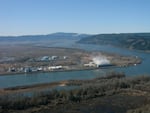
PGE's natural gas fired electricity plant on the Columbia River near Clatskanie, Oregon.
Flickr/Sam Beebe
The Oregon Public Utility Commission voted unanimously Tuesday to approve a request by Portland General Electric to sell nine oil storage tanks on the Columbia River near Clatskanie.
PGE is selling the tanks to the fuel distributor Global Partners LP, which owns the Columbia Pacific Bio-Refinery at Port Westward.
Environmental groups asked utility regulators to kill the sale to protect public safety because the tanks could be used to develop an oil-by-rail terminal.
Earlier this month, the commission postponed a vote on the sale after hearing comments from people who urged the board to protect them from the risks of shipping crude oil.
Related: Opponents Call Vancouver Oil Terminal 'Bad Plan' While Supporters Tout Jobs
Commissioners said before proceeding they wanted to get more information from their attorneys about whether they have the authority to deny the sale.
A subsequent staff report concluded that concerns about safety risks from shipping crude oil were "outside the scope of the commission's authority."
Jasmine Zimmer-Stucky, with Columbia Riverkeeper said the commission put corporate profits over public safety.
"The Commission ignored a rare opportunity to reduce the threat of oil-by-rail in communities along the Columbia River," she said. "Instead, the Commission joined several other Oregon agencies by putting on blinders and refusing to acknowledge the serious risk of oil-by-rail and oil spills."
PGE built the tanks to store oil as a backup fuel source for a nearby gas-fired power plant, but the plant has never needed that much oil as a backup fuel supply. The utility is required to consider the value of the assets to its ratepayers in deciding what to do with them.
PGE spokesman Steve Corson said maintaining the tanks or decommissioning them would cost money while selling them would generate income that could benefit the utility’s ratepayers.
The bio-refinery at Port Westward was originally built to produce ethanol, but its owner, Cascade Grain, quickly went bankrupt. In 2012, the facility was used to ship crude oil, but last year the current owner, Global Partners, announced it would switch to transloading ethanol in response to low oil prices.
The company now ships ethanol by rail to the site and transfers it to barges and ships, but it has all the permits needed to switch from ethanol to crude oil.
Buying PGE’s oil tanks will give the company about half as much storage capacity as the oil-by-rail terminal proposed by Tesoro-Savage companies in Vancouver, Washington.
Dylan Remley, vice president for terminal operations at Global Partners, said his company already has permits to build its own storage tanks, but with this sale it can refurbish the existing PGE tanks rather than building its own.
“We are encouraged by the prospect of revitalizing PGE’s underutilized neighboring assets as an alternative to building new storage,” Remley said in a statement.
Catie Kerns, a spokeswoman for Global Partners, said the company’s permits allow for shipping up to 1.8 billion gallons of ethanol or crude oil per year, but given the current market conditions the company plans to continue shipping ethanol — not crude oil — for the foreseeable future.
